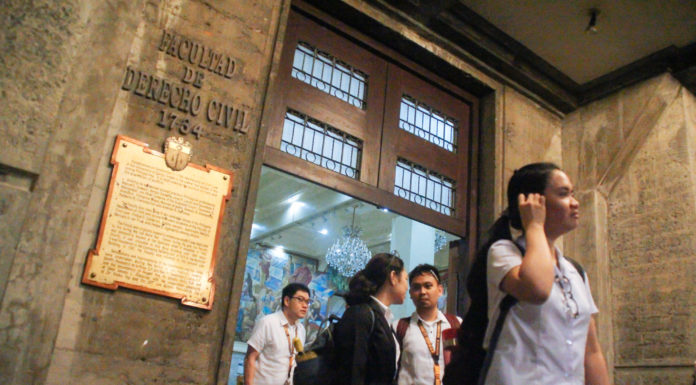FOR JENINABETH Imperial, a graduate of the Faculty of Pharmacy, working on a thesis involving laboratory animals was wearisome. She had to rent an apartment just to house all test animals, provide the prescribed environmental conditions, and conduct constant monitoring.
But with the efforts of the Research Center for the Natural Sciences (RCNS), students no longer have to go through all of that.
Last June 13, the Bureau of Animal Industry (BAI) granted UST a certification and license to maintain an animal laboratory and to operate an Animal Care and Use Program (ACUP) inside the University.
The UST program is being supervised by the Institutional Animal Care and Use Committee, composed of RCNS director Christina Binag as chairwoman, researchers Ma. Tomasa Ochoa and Jasmin Mendoza of Pharmacy and Josefino Castillo of the College of Science, resident veterinarians Dr. Cynthia Ochona and Dr. Sonia Ibarrientos, Ma. Aida Cañalete, non-academic staff and community representative; and Marcelo Gaza, animal caretaker.
Animal care and use programs require ethical standards in the use of animals for teaching and research purposes under Republic Act 8485, also known as the Animal Welfare Act of 1998.
“(The committee) provides guidance to Thomasians in properly conducting studies or experiments using animals with the highest scientific, humane, and ethical principles,” Ochoa told the Varsitarian.
Mendoza said government accreditation was vital in reviewing manuals involved in animal care and use, proper treatment, and compliance with guidelines on animal handling and disposal.
The BAI inspected the facilities several times to make sure UST complied with regulations.
“They gave us three separate certifications for the animal houses in the RCNS, College of Science, and the Faculty of Pharmacy, which is presently under construction,” Castillo said. “But we are considered one unit here in UST.”
Experimental “etiquettes”
Researchers who want to conduct tests and studies on animals are required to submit an experimental protocol.
“The paper shall include the procedures to be done in the study, the objectives, significance and background of the research, experimental designs, and declaration of responsibility towards the animals to be used,” Cañalete said. “The forms may be personally obtained in the RCNS office or downloaded in E-leap (the UST e-Learning Access Program).”
The University committee will review the protocols before approving the experiment.
“If facts are lacking, we will post recommendations,” Cañalete added.
According to Mendoza, the animals to be used must be purchased from certified animal breeders recognized by the committee, such as the National Institutes of Health at the University of the Philippines–Manila Campus, the Department of Science and Technology, St. Luke’s Hospital, the Bureau of Food and Drug Administration, and the Research Institute for Tropical Medicine.
“Animals coming from other distributors such as local pet shops are not to be accepted because we consider the strains of the animals to be used. Prescribed institutions provide certification clearances that the animal strains are safe and properly raised,” Mendoza said.
Castillo added that only specific strains of rats, mice, or rabbits like ICR mice, BALC/c mice, Wistar rats, and Sprague-Dawley rats can be used for research and experimentation.
These test animals will be housed in different facilities in UST. The animal houses have a separate area for rodents and non-rodents and a quarantine area where newly arrived animals are placed for several days before the experiment. They are also equipped with appropriate lighting, which is not too bright or too dim, as animals have sensitive eyes.
“The lights are switched on for 12 straight hours and turned off for the next 12 hours,” Mendoza said.
The houses are also maintained at a humidity of 50 percent with an interval rate of ±2 percent and a room temperature of 25 oC. Aside from these environmental conditions, which are regularly monitored, animal cages and beddings are frequently changed and cleaned, Ochoa said.
Animal cages must also conform to specifications on the number, size, and weight of occupants.
UST’s license to conduct animal researches and obtain accreditation for the research houses is a big advantage since the University is one of the country’s premiere science research institutions, where a large number of scientific studies take place every year, Ochoa added.












Hi, I was wondering where do you guys acquire the rats?